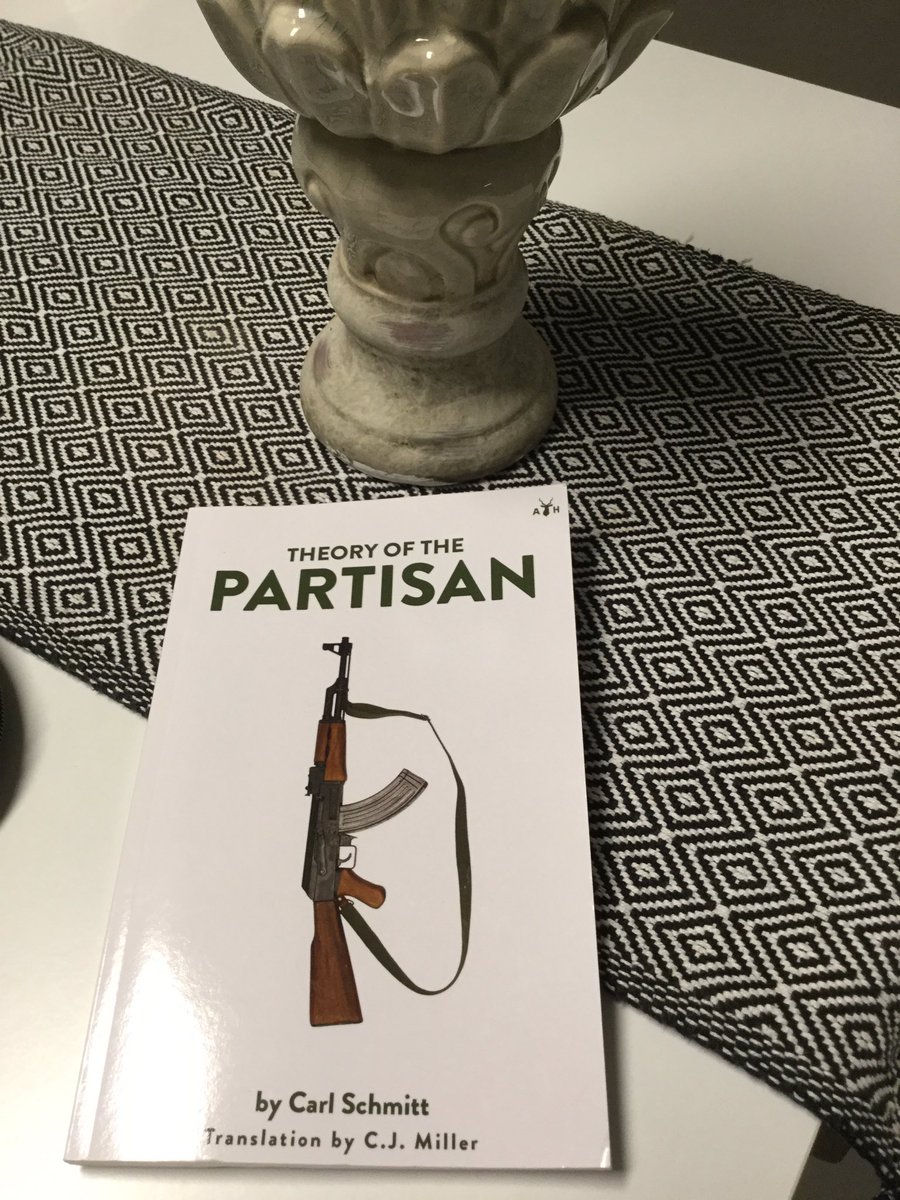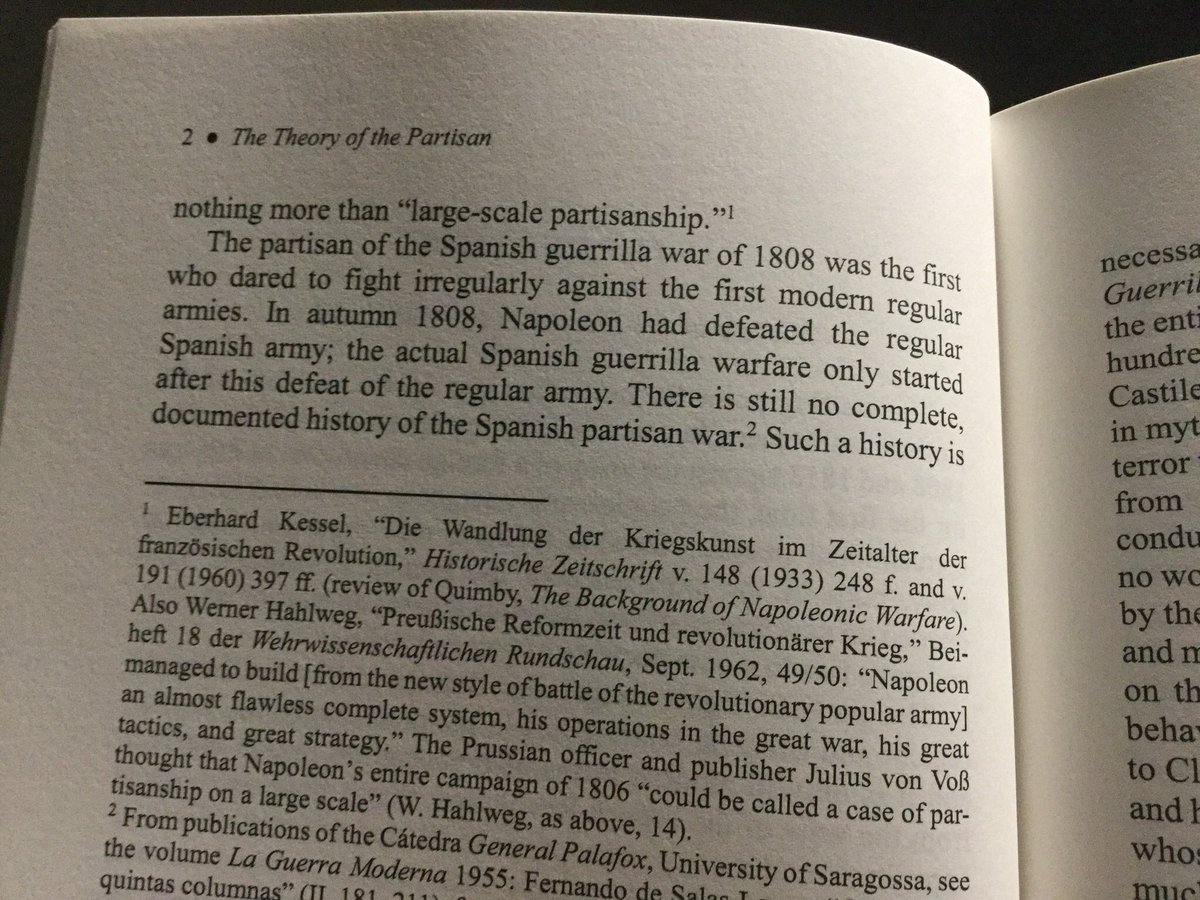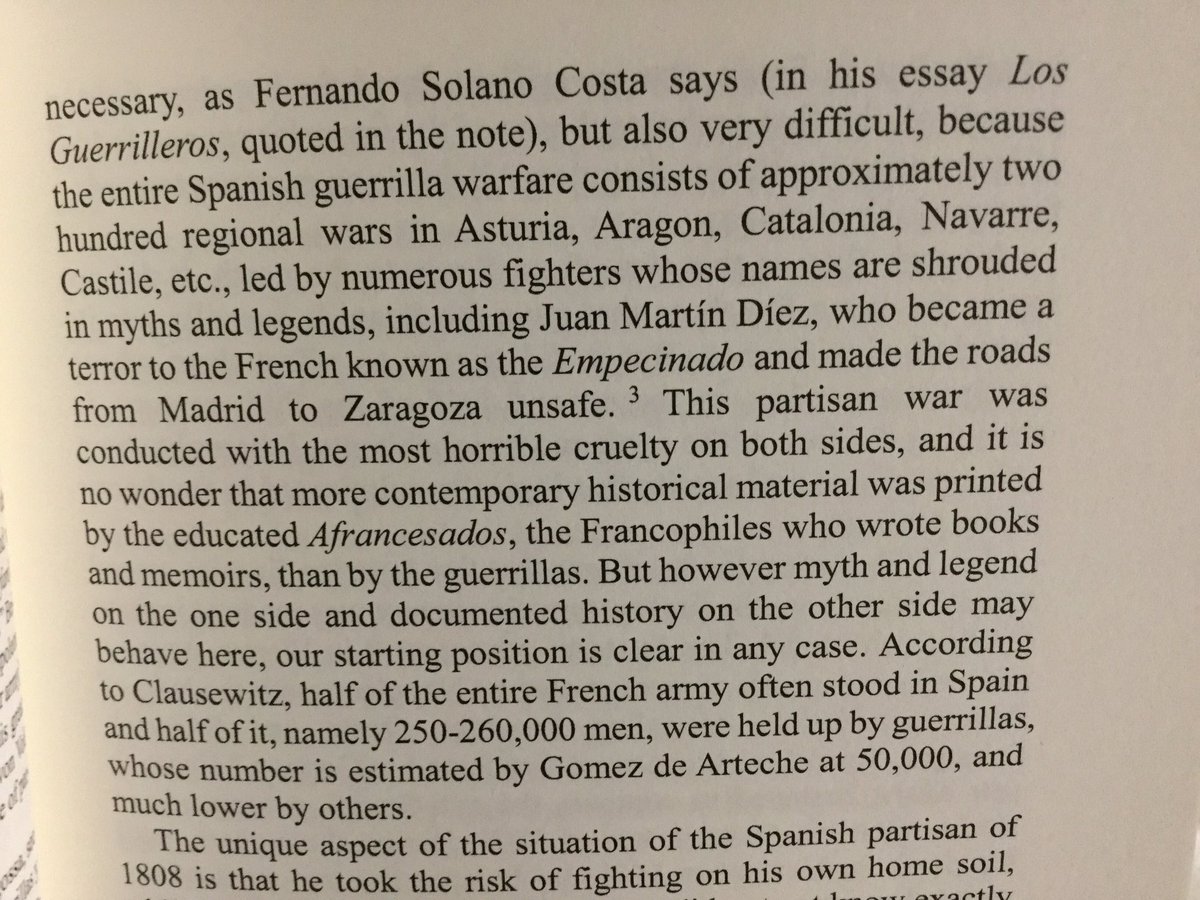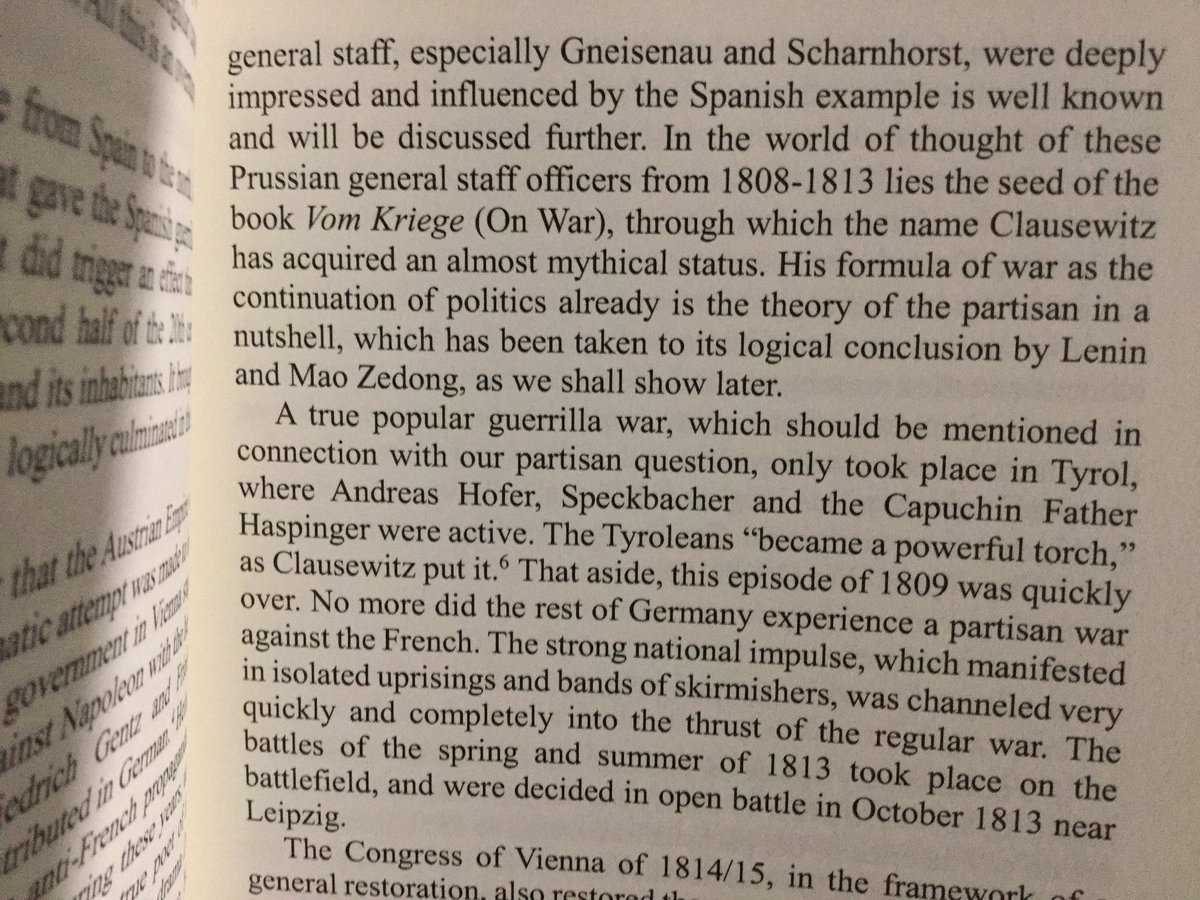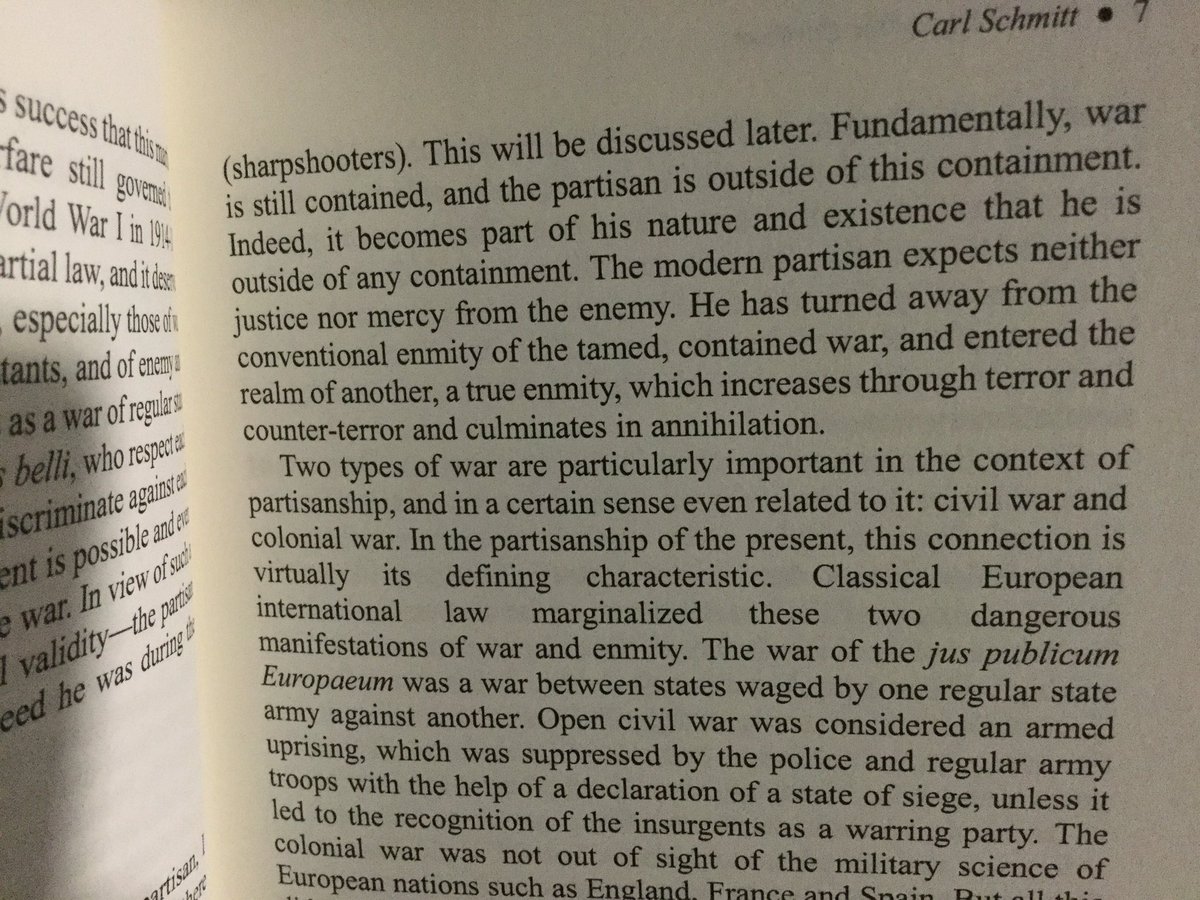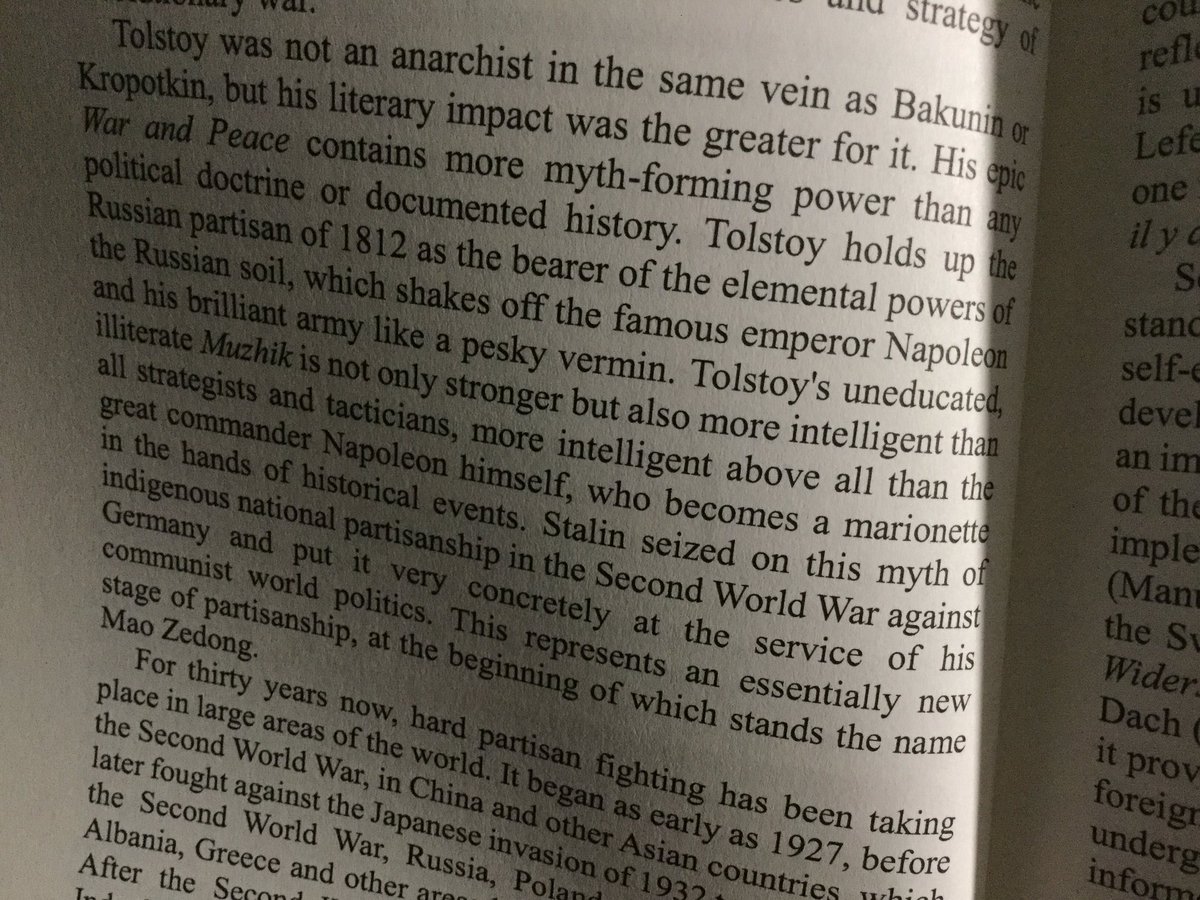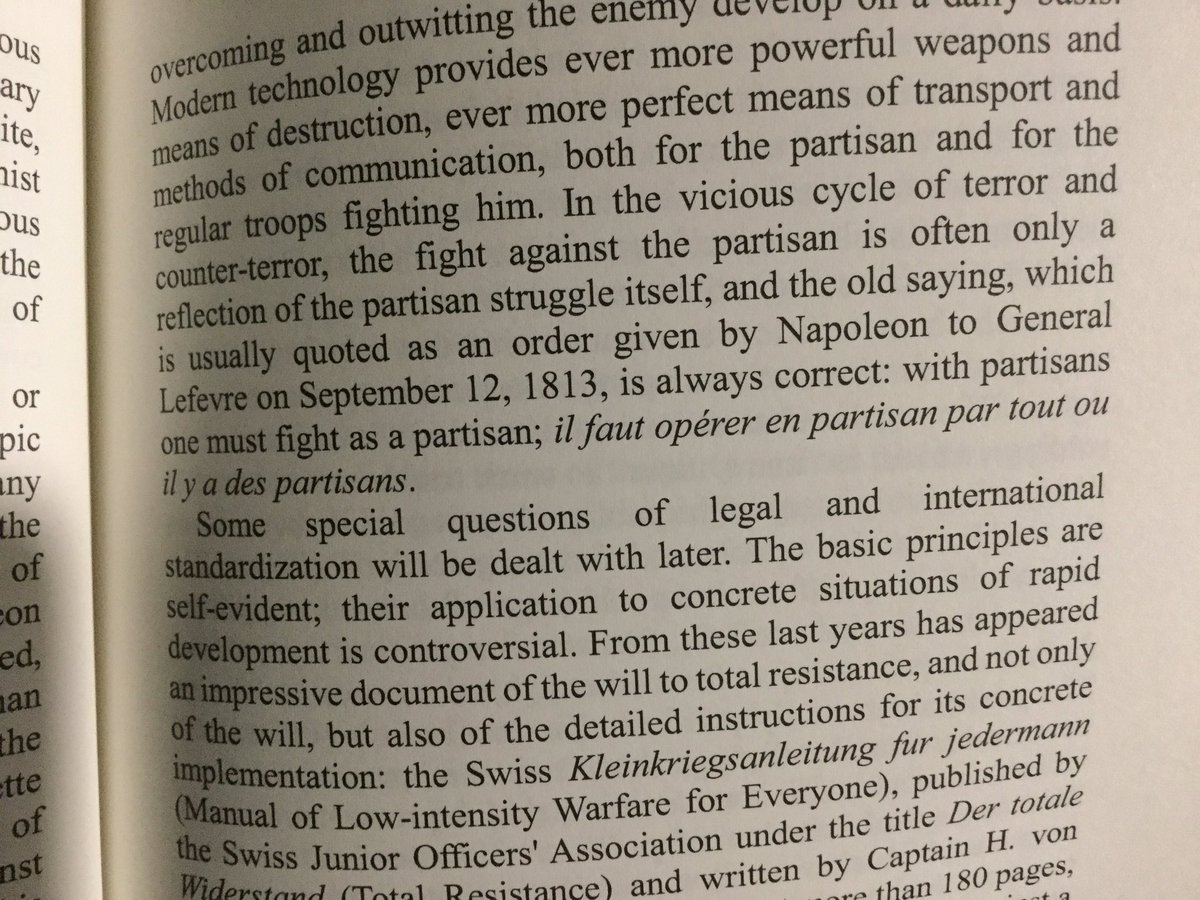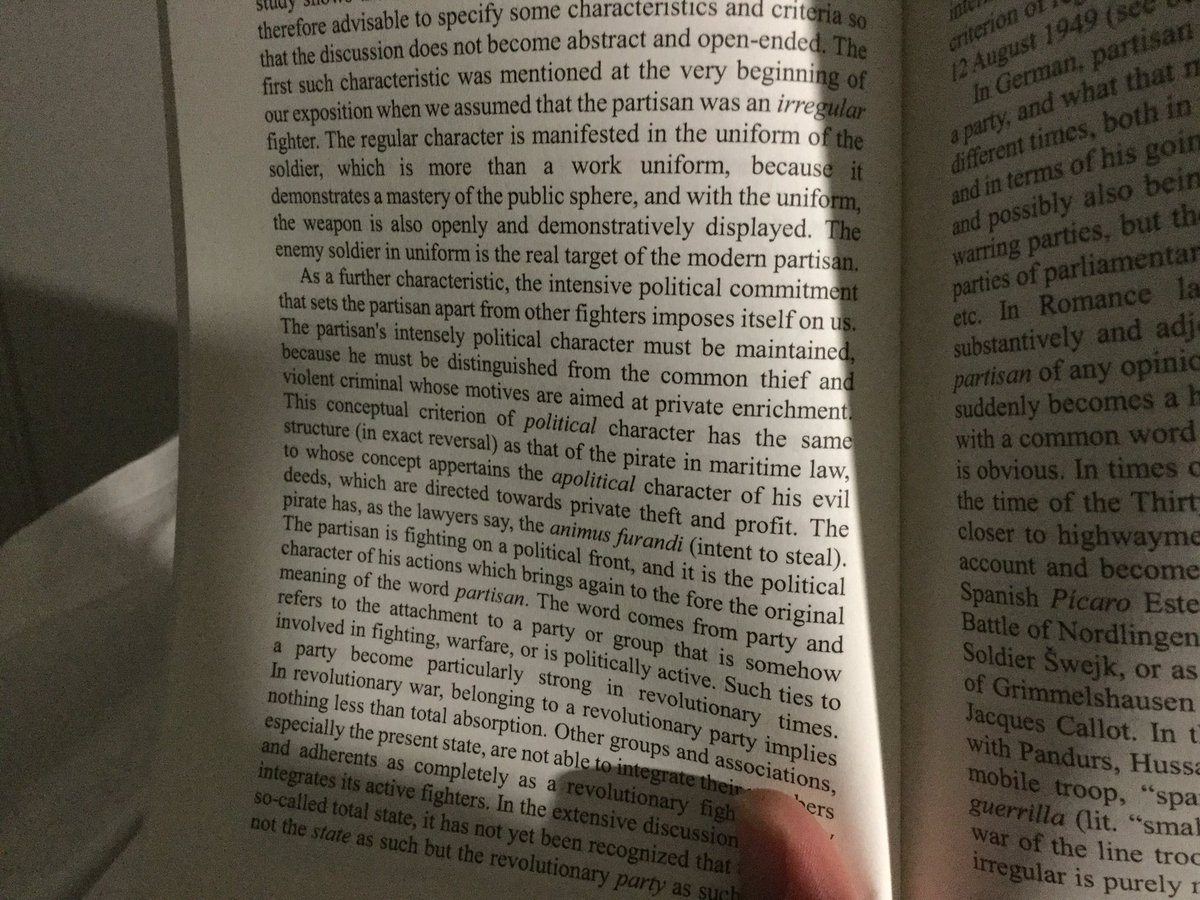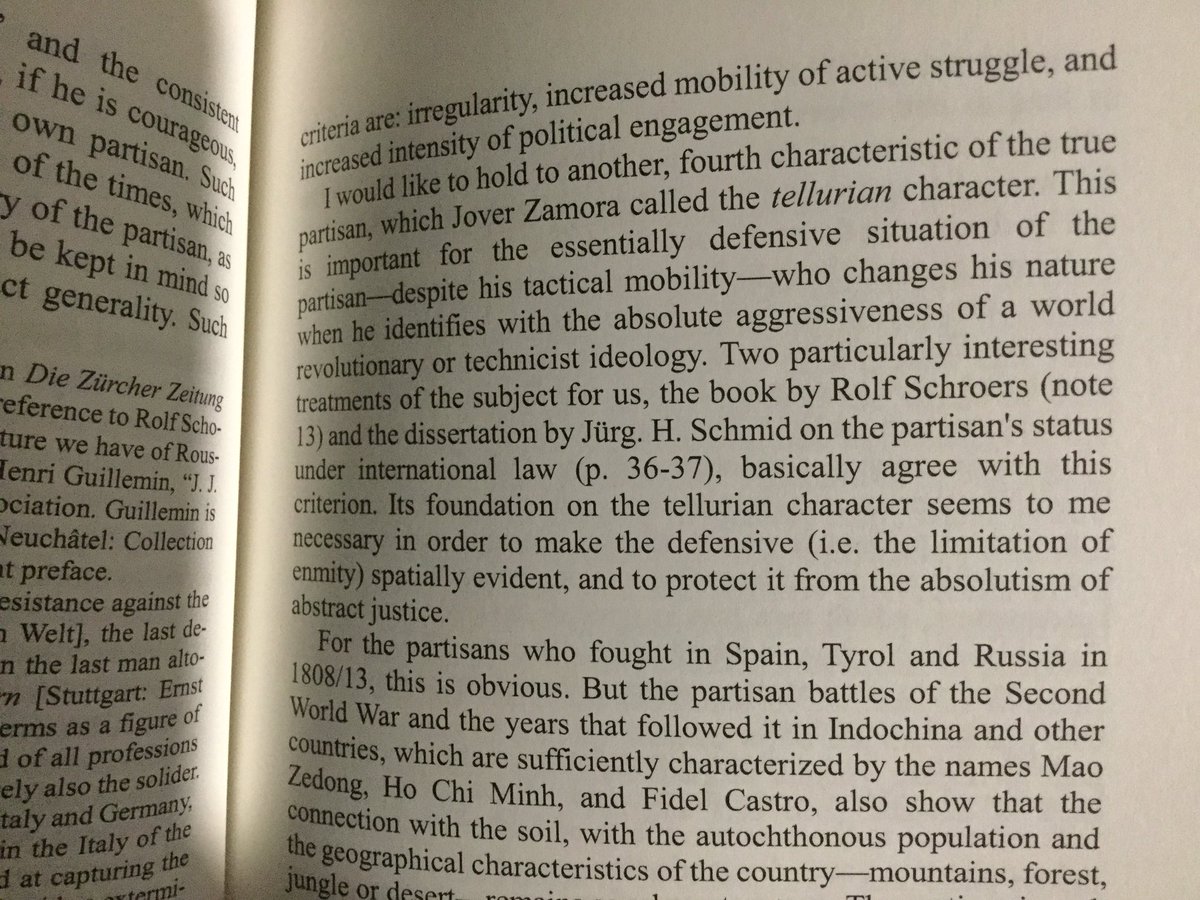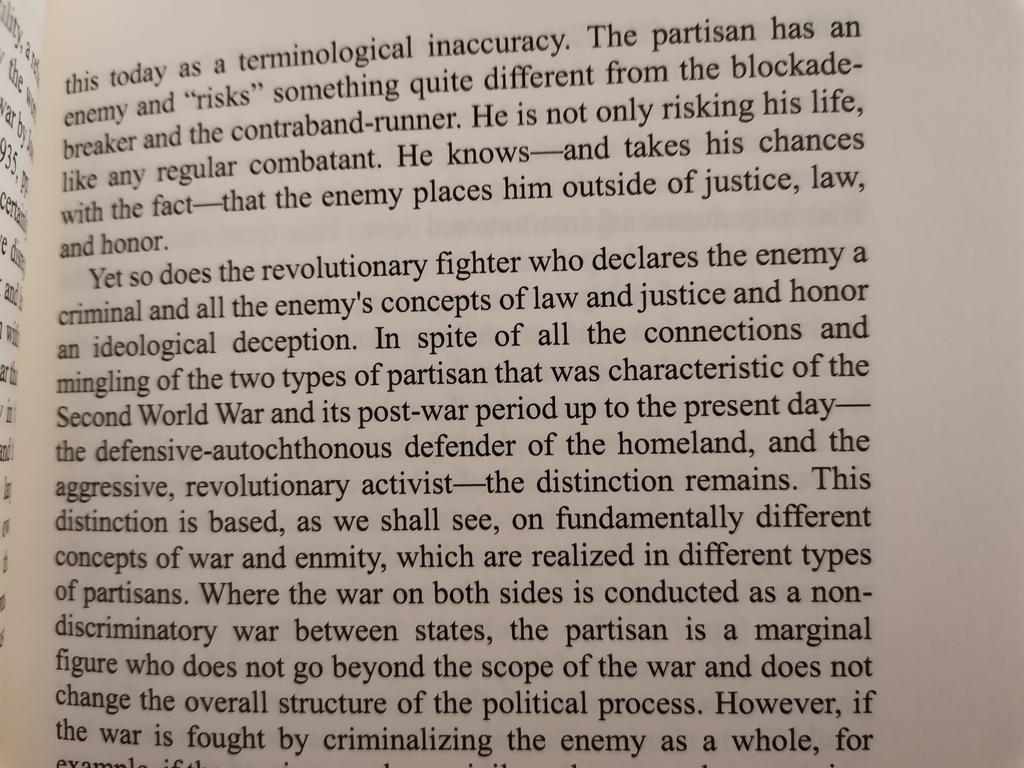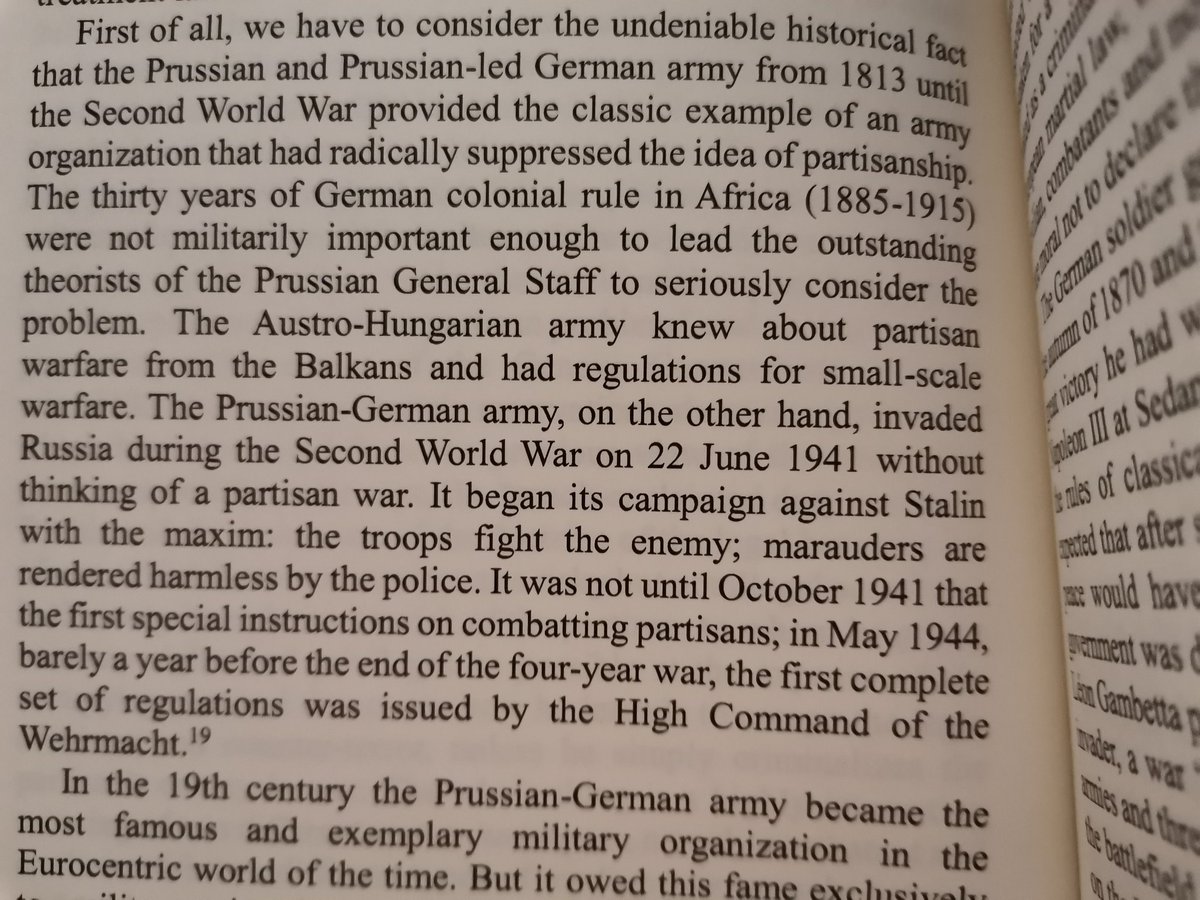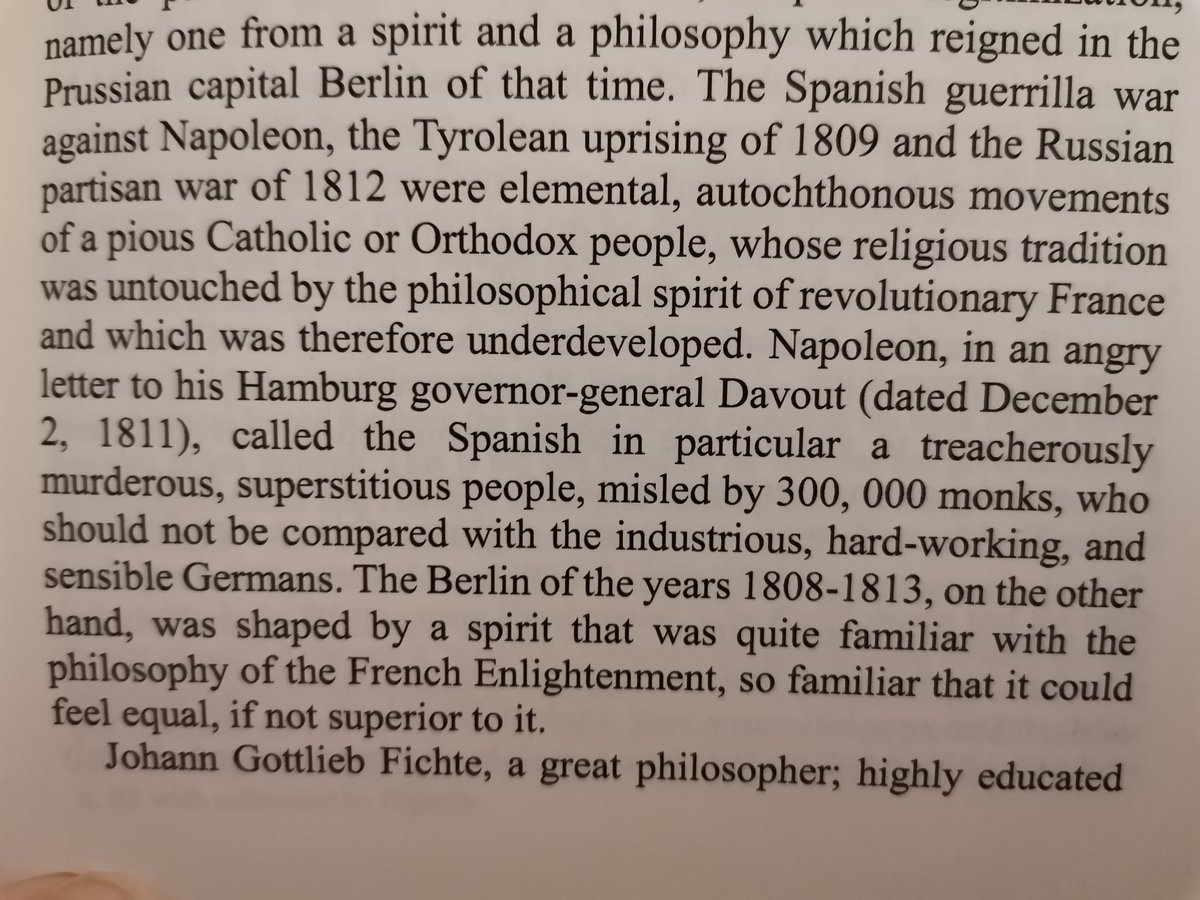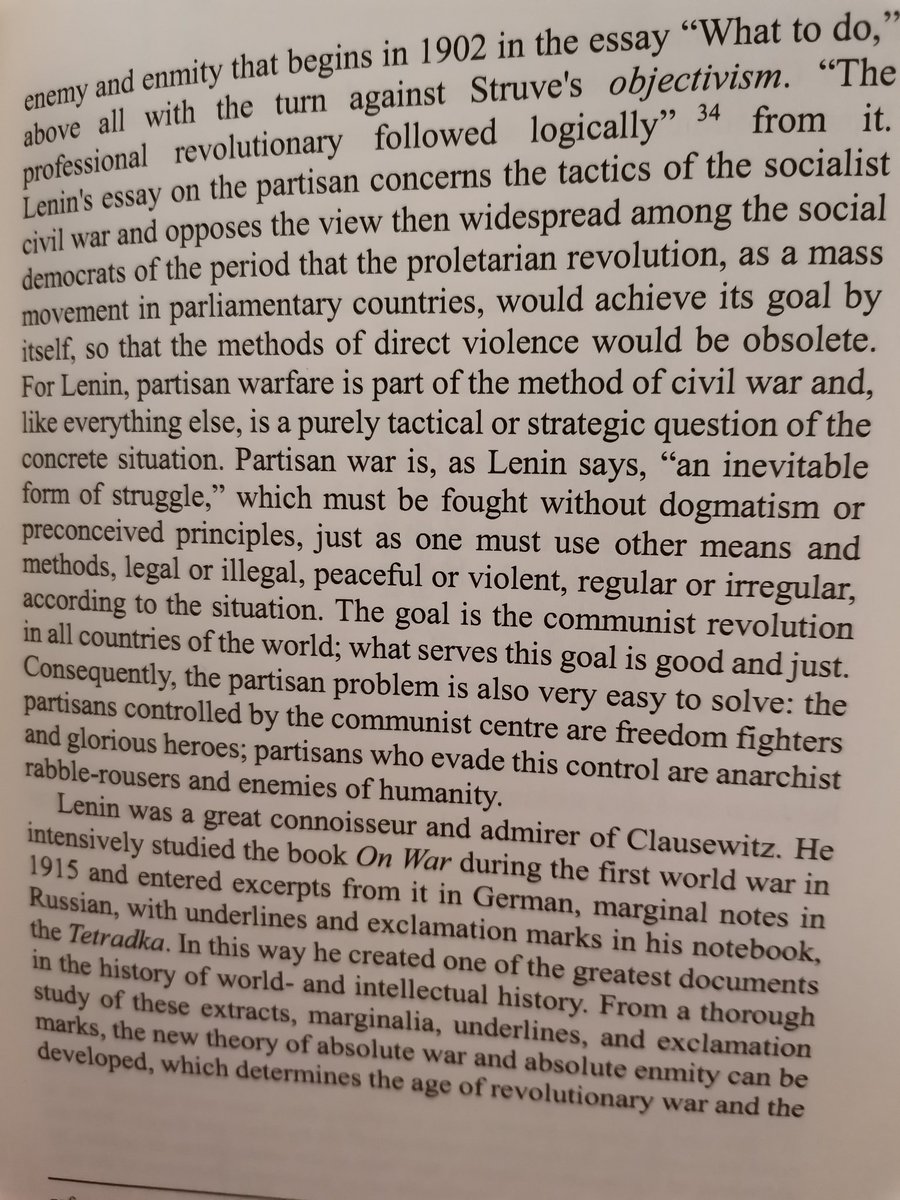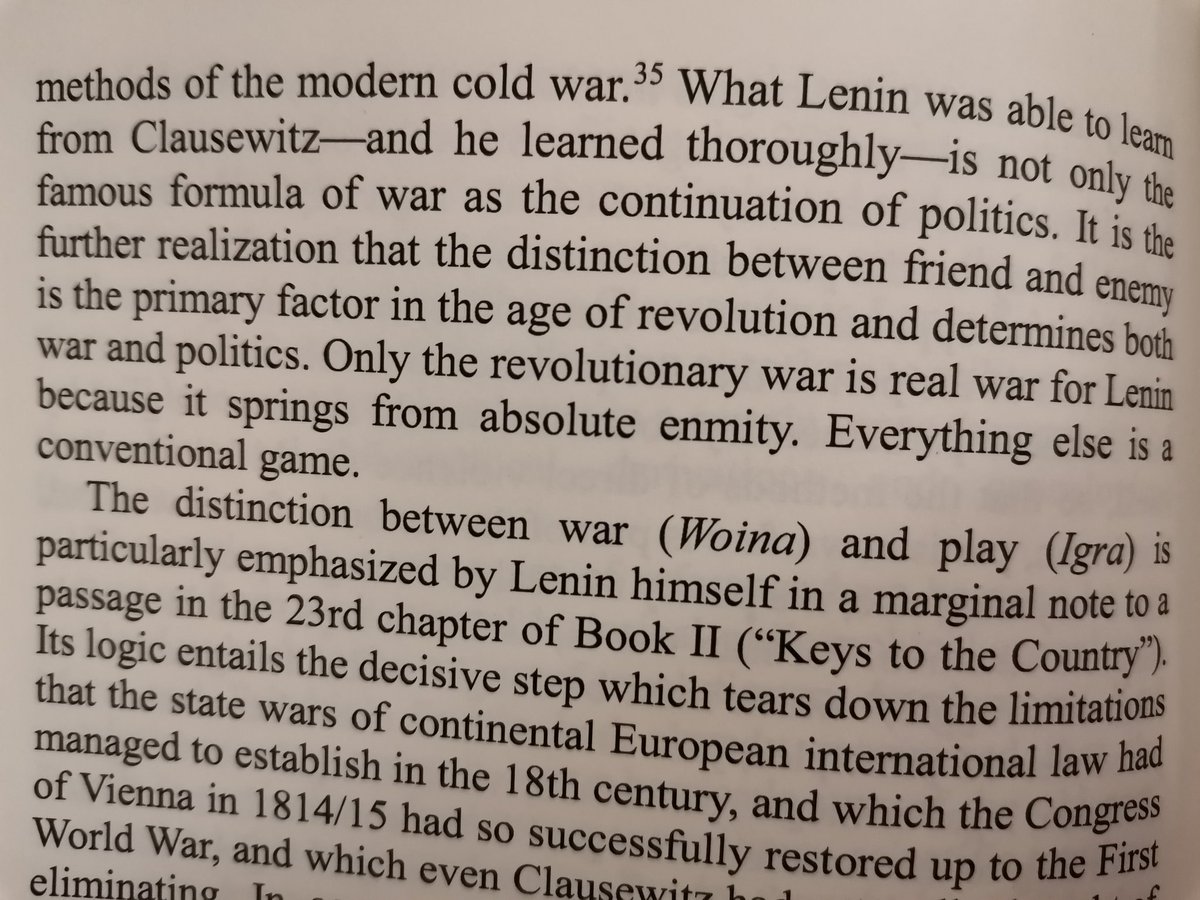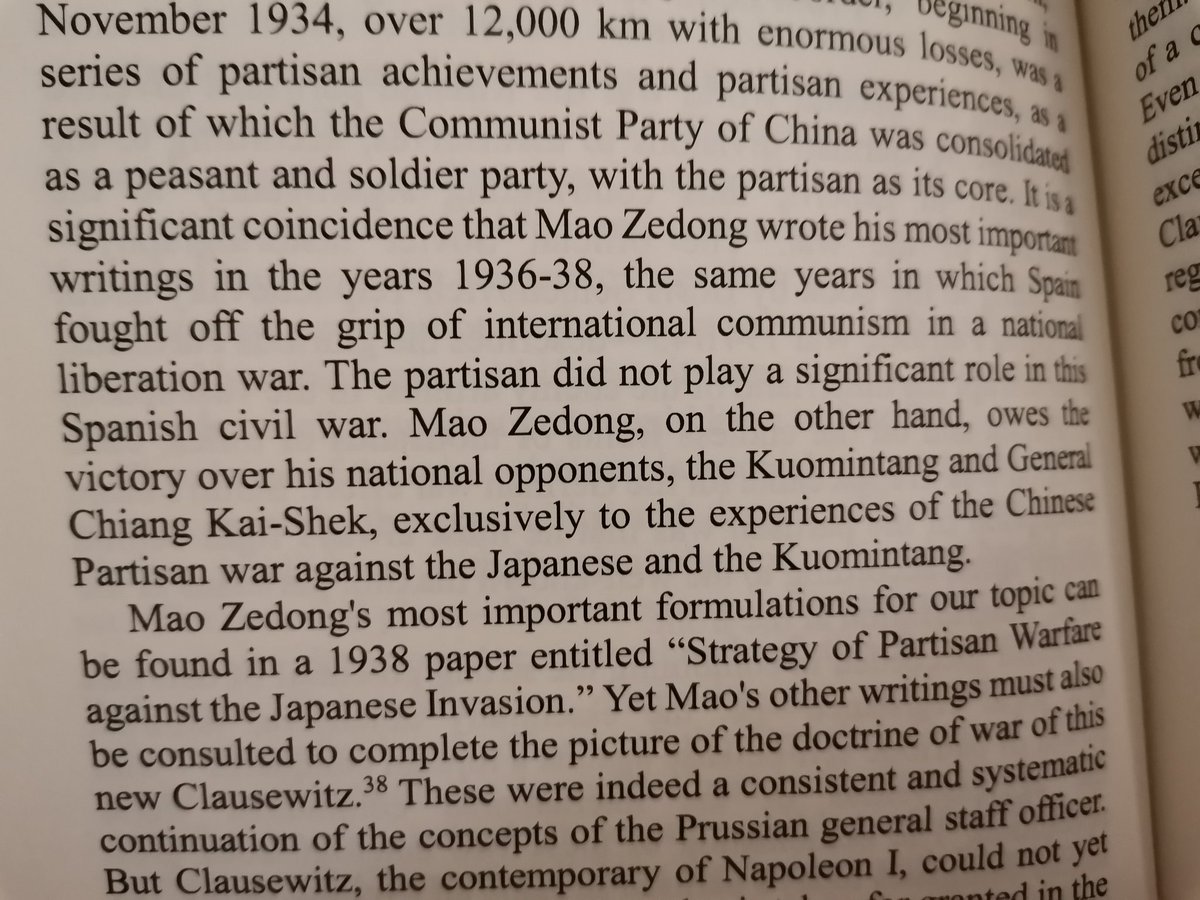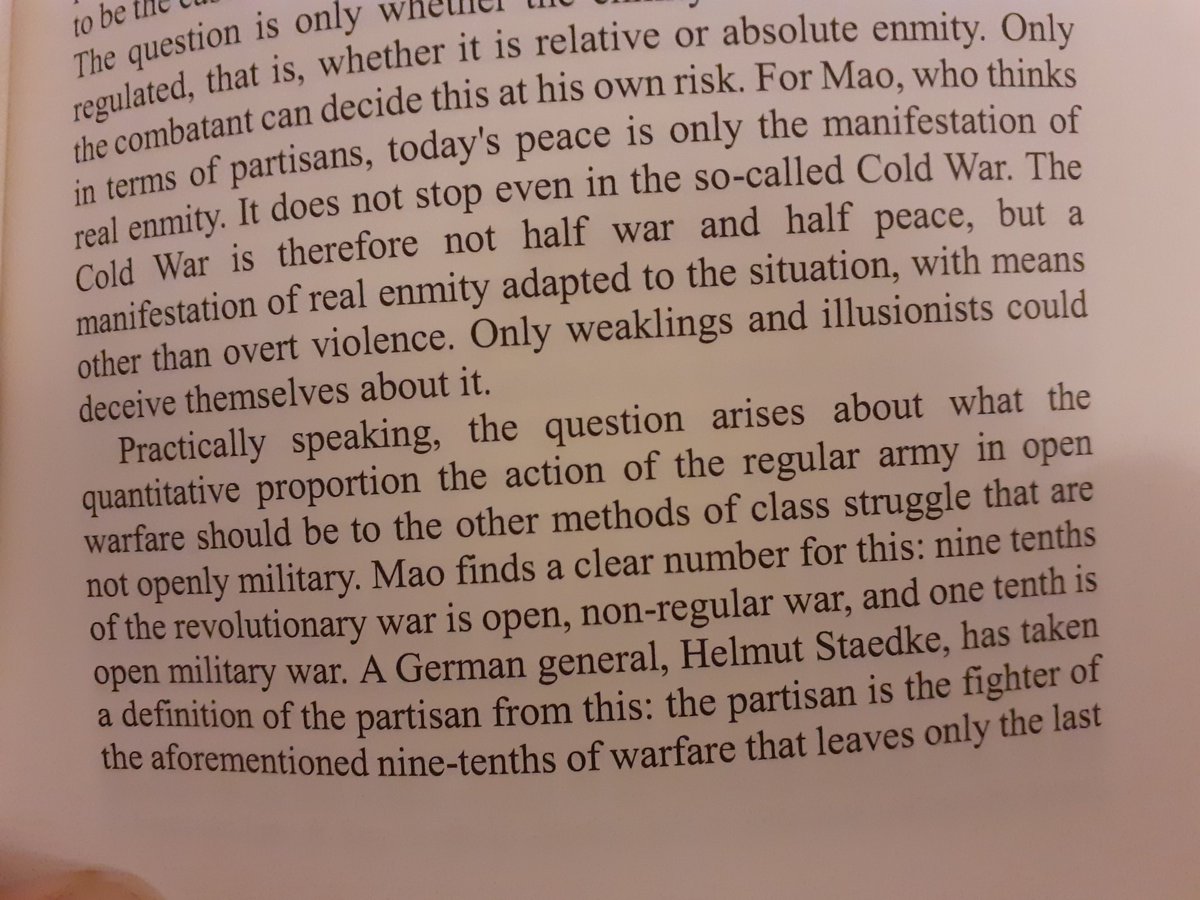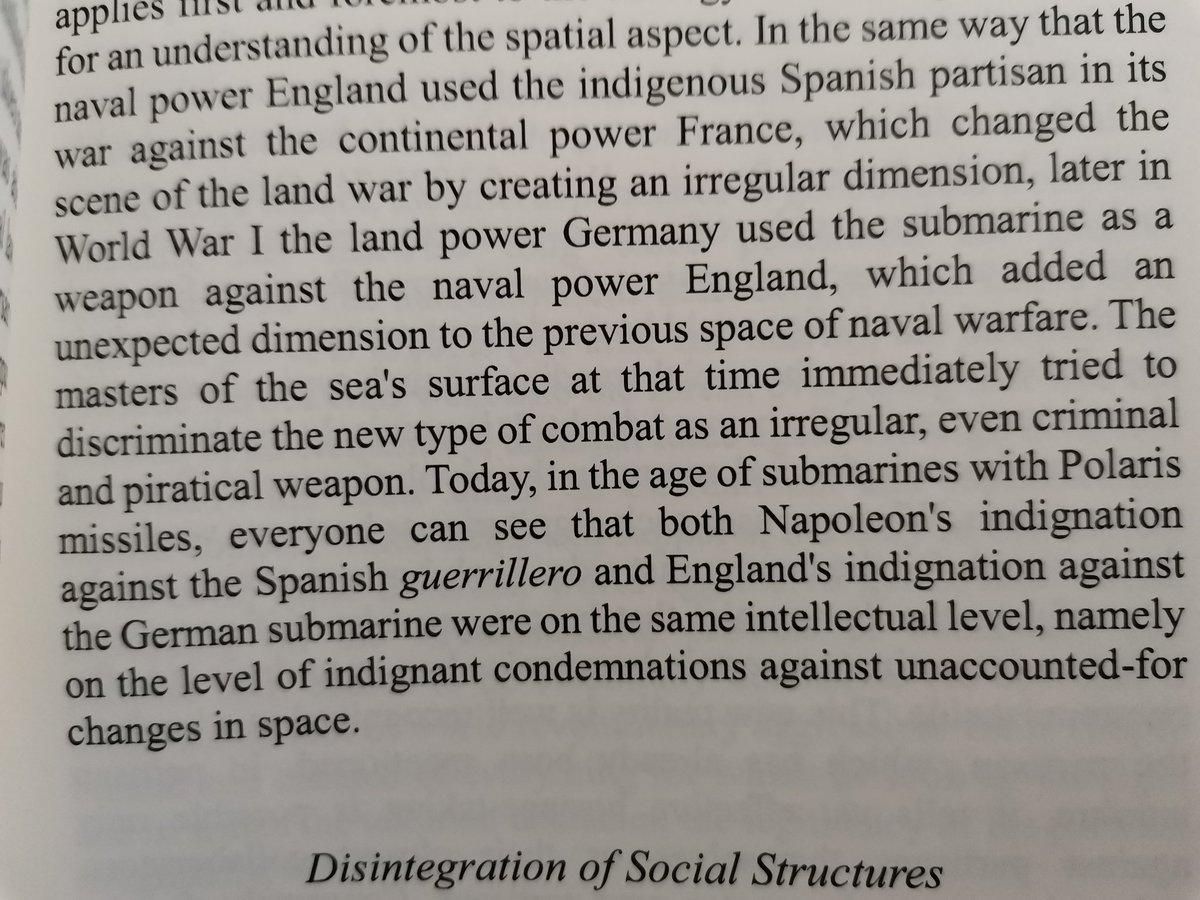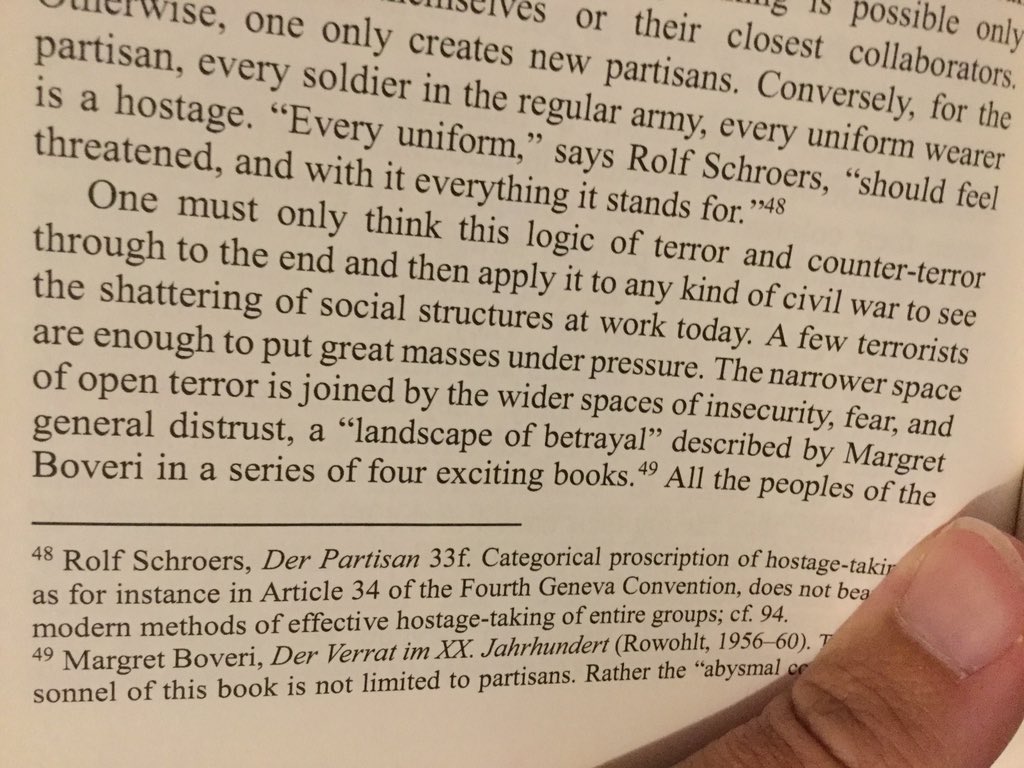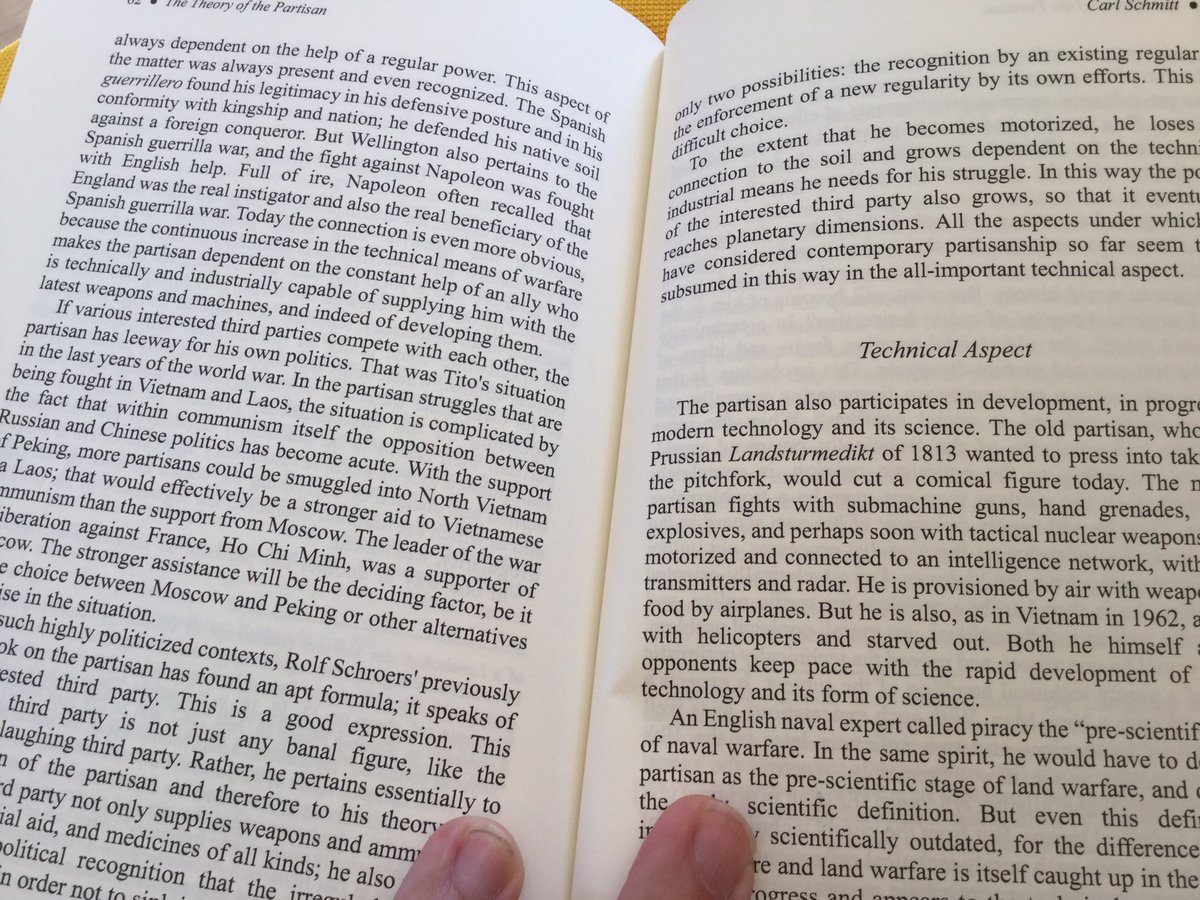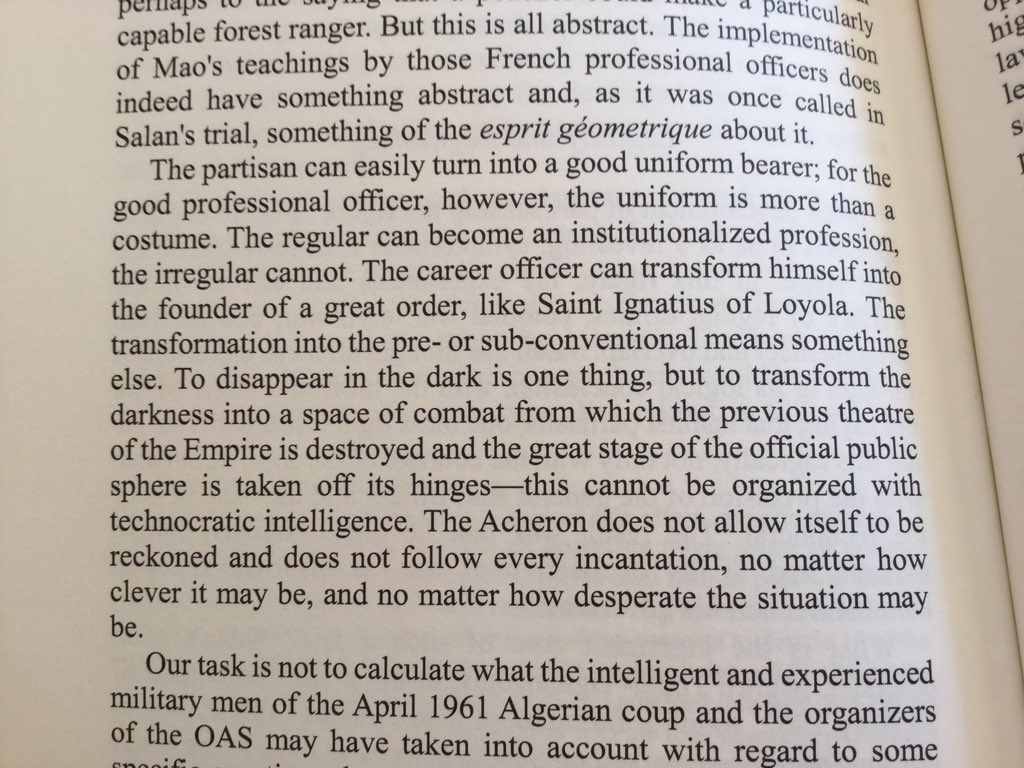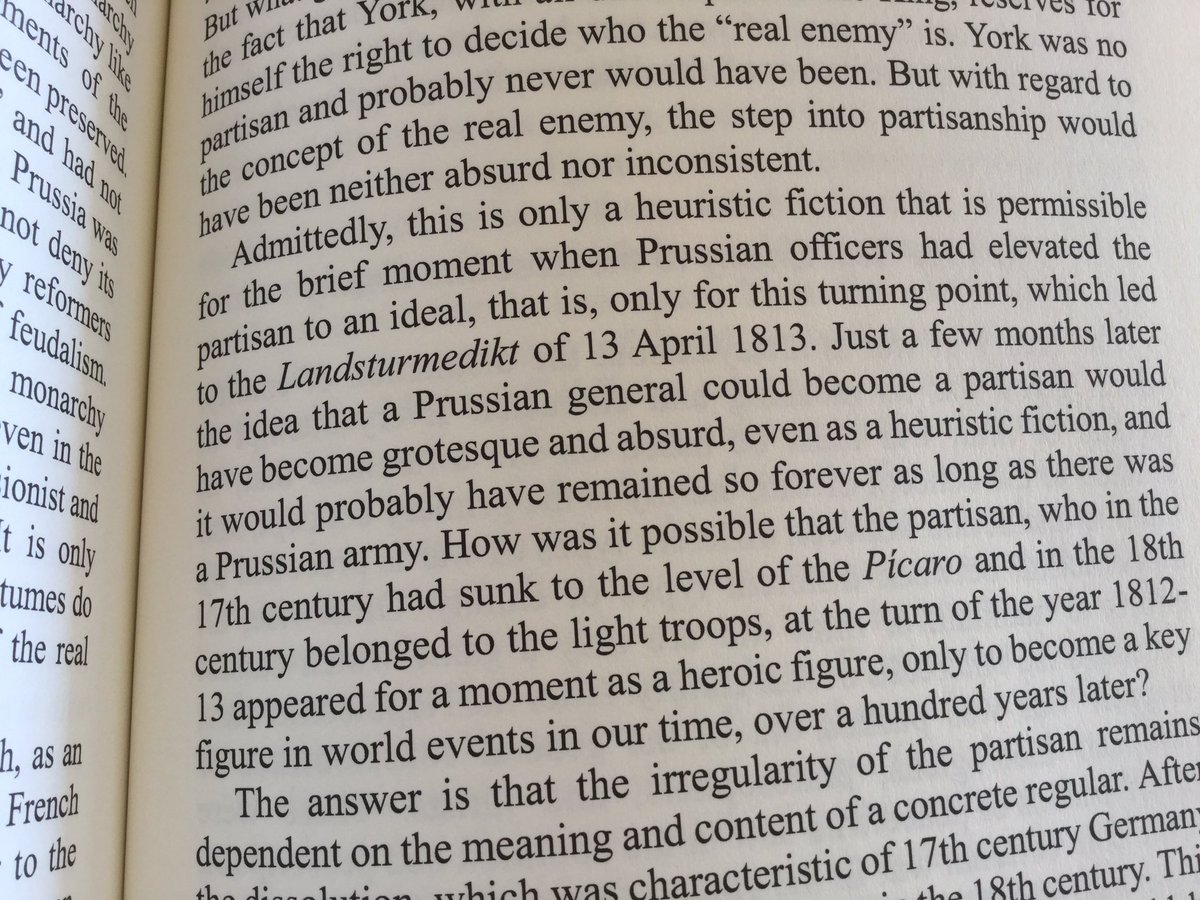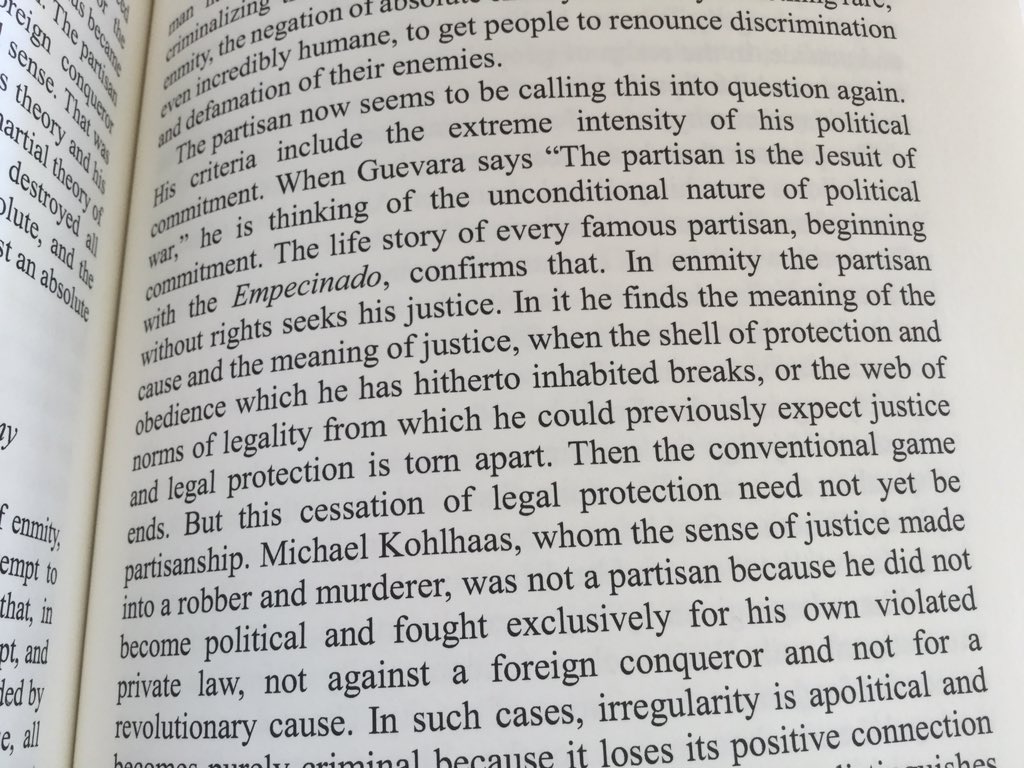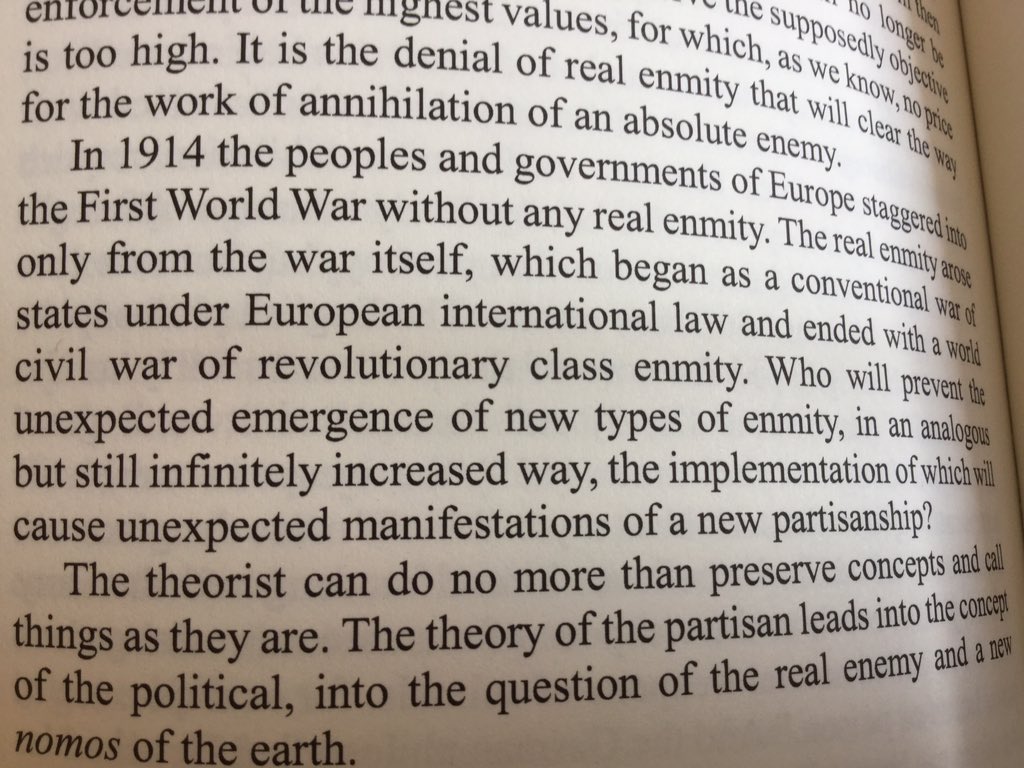I think it is an appropriate time for me to recover some Schmitt reading in these ‘Partisan’ times.
1/n
1/n
This book is a compilation of some lectures Schmitt gave in the spring of 1962 in Pamplona and Zaragoza.
2/n https://twitter.com/NachoOliveras/status/1162852797907394560">https://twitter.com/NachoOliv...
2/n https://twitter.com/NachoOliveras/status/1162852797907394560">https://twitter.com/NachoOliv...
Schmitt considers that the partisan is that who fights a regular army, and roughly sees the inception of the phenomenon during the Napoleonic Wars, and notably in Spain, where 50k ‘guerrilleros’ could put in check a regular French army 5x that size.
3/n
3/n
Von Kleist wrote poems to Palafox. Schmitt underlines The importance of those events in Spain, and the influence they had in Clausewitz, and later in Lenin or in Mao.
‘The modern partisan expects neither justice nor mercy from the enemy’.
4/n
‘The modern partisan expects neither justice nor mercy from the enemy’.
4/n
Russians fought also a partisan war in 1812.
Later Tolstoy helped crafting the myth in War and Peace, depicting uneducated Muzhiks as more intelligent strategists than the Emperor himself.
General Lefevre statement ‘with partisans, one must fight as a partisan’ is correct.
5/n
Later Tolstoy helped crafting the myth in War and Peace, depicting uneducated Muzhiks as more intelligent strategists than the Emperor himself.
General Lefevre statement ‘with partisans, one must fight as a partisan’ is correct.
5/n
The partisan has a political character, and is significantly different in this sense from the apolitical pirate.
The word itself signals party membership, which is its German meaning, whereas in Latin languages the word can also be used as an adjective.
6/n
The word itself signals party membership, which is its German meaning, whereas in Latin languages the word can also be used as an adjective.
6/n
Schmitt is not intending to use the word partisan as a metaphor, though that is possible, but creating a theory defining the partisan as:
1) irregular 2) mobile 3) political 4) tellurian, meaning their character is also different from the corsair in that they are ‘grounded’.
7/n
1) irregular 2) mobile 3) political 4) tellurian, meaning their character is also different from the corsair in that they are ‘grounded’.
7/n
The partisan assumes more risks than a soldier in a regular army. He is not protected by any convention. By the same token, this can make the partisan the true hero of the war...
8/n
8/n
From 1813 to 1941 the Prussian led German Army became the most formidable military machine in the Western world, and it did so having almost not met partisan warfare during this period, but only regular field armies.
The army even had no regulations to combatting partisans.
9/n
The army even had no regulations to combatting partisans.
9/n
Germany fought no insurrectional war against Napoleon, even if the intelligentsia was aware of what was going on in Spain.
Thus, in a letter to General Davout, Napoleon angrily compared the & #39;sensible& #39;, industrious Germans to the murderous, & #39;superstitious& #39; Spanish folk.
10/n
Thus, in a letter to General Davout, Napoleon angrily compared the & #39;sensible& #39;, industrious Germans to the murderous, & #39;superstitious& #39; Spanish folk.
10/n
The & #39;Parteiganger& #39; made it into a Prussian war edict of 1813 and into Clausewitz & #39;On War& #39; in spite of it, and from Clausewitz the idea made it to Lenin, who was an admirer of Clausewitz. The notes of Lenin on On War are, to Schmidt, one of the greatest documents in history.
11/n
11/n
What did Lenin learned from Clausewitz? The realization that the difference between friend and enemy was the primary factor in the age of revolution.
12/n
12/n
Lenin influenced Mao, with his concept of absolute enmity. And Mao, deemed a new Clausewitz by Schmitt, would have never seized power from Kuomingtang had not he waged a partisan war against Japan. Chinese communist, unlike Bolsheviks, seized power after experiencing defeat.
13/n
13/n
Mao also wrote that partisan struggle was, in proportion, 9/10 of the fight, whereas regular armies do only 1/10, and only when the situation is ripe for their action.
Staedke, a German general, defined the partisan thus as the fighter who does 9/10 of the fight as well...
14/n
Staedke, a German general, defined the partisan thus as the fighter who does 9/10 of the fight as well...
14/n
This is excellent: & #39;Both Napoleon& #39;s indignation against the Spanish guerrillero and England& #39;s indignation against the German submarine were on the same intellectual level, namely on the level of indignant condemnation against unaccounted for changes in space& #39;.
@paulportesi
15/n
@paulportesi
15/n
A few terrorists are enough to change the atmosphere into one of general mistrust, or into a ‘landscape of betrayal’.
16/n
16/n
A good caveat: the partisan always depends, in ultimate instance, of regular powers. Thus the Spanish guerrilla needed Wellington. You could say as well that the Catalan independence guerrilleros would need recognition from say Britain, France and the US, which is unlikely.
17/n
17/n
Lacking the logistics support, partisans can also win by getting the recognition of the other powers.
Say Salvatore Giuliano could have become a Sicilian dictator had it been in the interest of US military policies.
Pirates were on the verge of getting official recognition.
18/n https://twitter.com/nachooliveras/status/1301795565915774976">https://twitter.com/nachooliv...
Say Salvatore Giuliano could have become a Sicilian dictator had it been in the interest of US military policies.
Pirates were on the verge of getting official recognition.
18/n https://twitter.com/nachooliveras/status/1301795565915774976">https://twitter.com/nachooliv...
Technical note.
What will become of the partisans on the nuclear age?
Schmitt envisioned his disappearance or states going self-destructive partisans, then maybe ‘cosmonaut partisans’, he was probably eaten by space propaganda, @PaulSkallas.
He didn’t see Twitter coming.
19/n
What will become of the partisans on the nuclear age?
Schmitt envisioned his disappearance or states going self-destructive partisans, then maybe ‘cosmonaut partisans’, he was probably eaten by space propaganda, @PaulSkallas.
He didn’t see Twitter coming.
19/n
The partisan ultimately needs legality/regularity in order not to be permanently perceived as a common criminal, if he succeeds, he can then become an official. Saint Ignatius of Loyola is even cited as an example, I guess to please his Spanish guests (it works). Then Salan.
20/n
20/n
The idea of an army General going partisan seemed long time an absurd one, and indeed in some contexts it was. There is an asymmetry there, that is why Raoul Salan’s case seemed to fascinate Schmitt. The Empecinado seemed rather a partisan that got recognized by the people.
21/n
21/n

 Read on Twitter
Read on Twitter